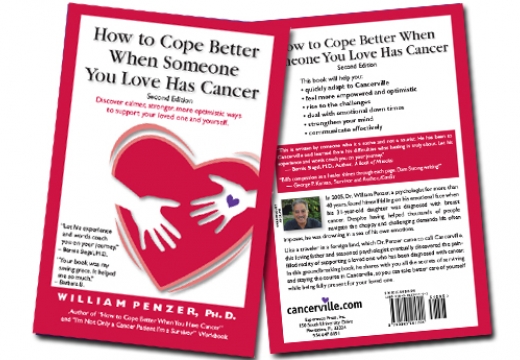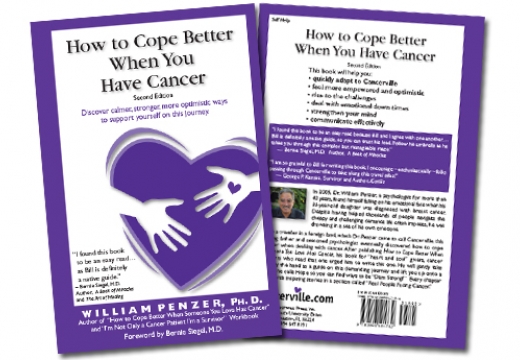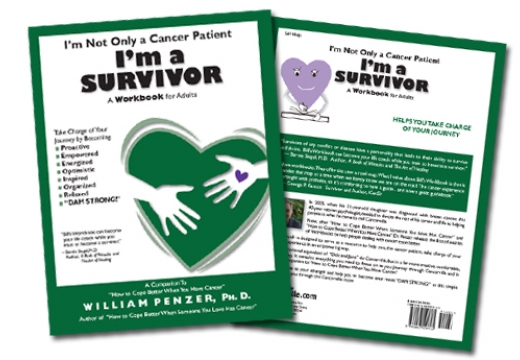-William Penzer, Ph.D.
Unfortunately, too many people are being treated for cancer these days. Each year in America alone, one-and-a-half million people of all ages are diagnosed with some form of cancer. It is hard to find someone who has not been impacted by cancer. I was in just that position a few years ago when my young and innocent daughter was diagnosed with breast cancer at age thirty-one. While sitting in the waiting room of Memorial Sloan-Kettering Cancer Center, I came to realize that cancer is not only a horrible and hated medical diagnosis, but also a place. I knew then that my daughter, my wife, and I had entered what I came to call Cancerville.
In the 80’s, after helping several people who were fighting cancer, I began to say to myself during stressful times: “If it ain’t chemo it ain’t nothin!” Please do not report this to my former English teachers, as they would be appalled. That simple but grammatically irreverent idea put many things in perspective; it helped me assess and address but not stress over the relatively minor problems I encountered.
I could not have imagined, when I created that phrase in 1985, that my daughter would have to face chemo and other cancer treatments twenty years later. I am pleased to report that she is doing very well now; almost seven years after her hellish journey began.
Having been to Cancerville by proxy, I understand more clearly what people need to take with them when dealing with surgery, radiation, chemotherapy, and the like. You need to pack a lot more than your medical ID, PJs, or a warm sweater. Here are my suggestions of five things to bring along to help strengthen your mind and your body:
A Positive Attitude
Perhaps this is very obvious, but it can be difficult to maintain a hopeful, positive, and optimistic mindset when you are in Cancerville. It takes a great deal of work to push past the fears and worries, intrusive and debilitating treatments, fatigue, and disruption to just about every part of your world. You will likely fall off the horse I call Hope many times—but what is important is that you dust yourself off and get back up on that horse. Her stride is strong and her balance will help you keep yours as well.
In my books I talk about approaching Cancerville “balls to the walls positive.” I believe that women have them, too, and that, though invisible, theirs are bigger than men’s! Being positive is backed up by research, which shows that, when it is realistic, optimistic beliefs both make the journey easier and can often tilt the results in a successful direction. Anticipate pain, failure, distress, or disappointment, and you will likely get just that. Expect the opposite and you will likely experience a much better result. This holds true whether you are making a speech, hosting a dinner party, planning an important business presentation, or making the rounds of Cancerville protocols. Self-fulfilling prophecy is alive and well in all of us.
Many people have unique ways of spinning things in a more positive direction. Former football great and member of the Dolphin perfect season of 1972, Jim Mandich, known for his partying ways, called his chemo treatments “happy hour.” Other people I know who have been to Cancerville have also found ways to face it positively. Josh, treated for metastasized testicular cancer at age twenty-three, spun his web of positive expectations from his faith in the Lord. Cristina, who spent 24/7 in the hospital with her young son Jake for five months while he was being treated for leukemia, decorated his drab room with colorful and creative wall hangings. She changed them weekly and went all out for July 4th, Halloween, and Thanksgiving. Eileen went rollerblading on the boardwalk a few mornings after she was diagnosed with uterine cancer. “I just needed to get out in the sun and do something active,” she said. Roberta and Shelley, both survivors, joked and laughed a lot during their treatments.
Positive mindsets come in a variety of personal styles. I am encouraging you to seek out as many as you can find that work for your nature and put them in your backpack before each treatment. If possible, draw from them the night before you are scheduled, to pump up your emotional muscles. The stronger you can approach Cancerville, the more you will be able to hold your own on its turf. Cancer is a formidable foe, but so are you!
Affirmations
Affirmations are important tools that feed and stimulate your positive attitude. They are simple, positive, affirming statements that can be repeated over and over in your mind. They help strengthen your resolve and provide a basic script for more positive self-talk. They can help you stare back at cancer in an empowered way. Here are some examples:
- I can and will cope with the treatment today.
- The side effects of the treatment will be minimal.
- Today’s treatment will hurt my cancer cells more than me.
- My doctors and I are fighting back strongly.
- Let’s just move forward.
- I will be a survivor.
Or, you can imitate ESPN commentator Stuart Scott as he rails at his stomach cancer cells: “Nah, dawg, I’m better, I’m stronger. You’re not going to beat me. You can try, but I’m just going to come harder than you. I’m gonna come harder than you all day long.” Stuart also practices martial arts a few days after his chemo treatments to further kick his cancer’s butt. Now that is what I call an affirmation!
Like Stuart, be creative in finding the right affirmations for you. Come up with some strong words of fight like a cheerleader at the sidelines of a football game. Root, root, root for your home team, which in this case is YOU!
Relaxing Resources
We all differ in what is a relaxing influence for us; different people find different things relaxing. For the most part, it doesn’t matter what is relaxing for you, just as long as you bring it with you to your treatments. Some download music that ranges from spiritual to spa, light jazz to oldies, or rock all the way on up to heavy metal or rap. Some people enjoy recording poetry on their smart phones, while others prefer biblical passages or sermons on theirs. Many will choose relaxation exercises to record and listen to, while others prefer spooky or “rockem sockem” movies. It is not important what you pack to help you relax—it is important that you pack them!
All of the above offer a natural way to calm jangled nerve endings that can be caused by your Cancerville experience. There are times when everything about the place is jarring, unnerving, and upsetting. You need to bring along some healthy tools to counterbalance those influences.
What about those who find working out, jogging, or rollerblading calming? Though it is not likely that you can do vigorous exercises in the corridors of Cancerville, you can see yourself doing that in your mind’s eye. Just close your eyes and play a video of when you were active. Use those images to calm yourself down and dump excess adrenaline.
Similarly, you can do the same with happy images and fun trips and experiences that you have recorded in your brain. Like a deluxe TV cable system, your brain carries many, many channels filled with good videos and vibrations. Click on your personal remote and you can be back there in better times, while you face these more challenging ones.
Distractions
Some treatments in Cancerville—as well as the wait time before and after—can be long. I encourage you to pack enjoyable distractions that engage your mind. If I were scheduled for a treatment, I would bring a yellow pad for journaling and a kindle for reading, along with my smart phone with soothing music, all intended to occupy my mind and distract it from the Cancerville scene. Here is a sample of some distractions that others have told me they bring:
- crossword or other puzzles
- knitting or needlepoint
- light or funny books
- downloaded movies
- newspaper or a magazine
- sketch book
- laptop
The more you can distract yourself from your experience, the better you will feel. Cancerville treatments are a mean means to a life-saving end. The less you focus on them and their side effects, the faster you can heal and move forward.
You May Need a Larger Backpack for This One
If you can, bring a warm, upbeat, supportive cheerleader with you. For most people, nothing helps as much as human kindness and interactive distraction at important times. I understand that this is not always possible, which is why the other four tools are so important. But if such a person exists and is available, by all means see if he or she will come along.
Bring someone whose influence contributes to all of the previous suggestions. You need someone who is positive, affirming, relaxing, and distracting. Do not bring someone who you find toxic, irritating, annoying, or a downer. By all means leave that type of person home; there is no room in your backpack or your mind for such a person. Only bring someone with you if you can count on him or her to help you rather than hinder or add additional burdens. You have enough of those on your emotional plate already!
It is okay if there is no one who fits the bill. You can relax and distract yourself while maintaining an affirming and positive mindset. In addition, the nurses and staff members at treatment facilities are typically very sensitive and supportive. Others seeking treatment along- side you can be helpful and distracting as well, as they know what it is like to be there. If you tend to be the shy, quiet type, try to stretch a little in Cancerville and reach out to talk to others. You just never know where your next source of inspiration might come from. Try to hold onto the belief that you can get through your Cancerville treatments in a strong way.
In Sum
When heading for treatment in Cancerville, bring as many supports with you as you can. A positive mindset and affirmations can empower your fight, while relaxation tools and distractions can take your mind off the Cancerville scene. Together these tools will help keep your mind strong while fortifying your body to take on the treatments, heal more quickly, and move forward toward more comfortable and peaceful times. I am optimistic that you will do everything you can to defeat cancer and join the many survivors who have walked the Cancerville maze successfully. Toward this end I wish you well.
William Penzer, Ph.D. is a practicing psychologist in Ft. Lauderdale and Boca Raton, FL. He is the author of the recently published book “How to Cope Better When Someone You Love Has Cancer.” Dr. Penzer can be reached at cancerville.com.
Back to Article List





